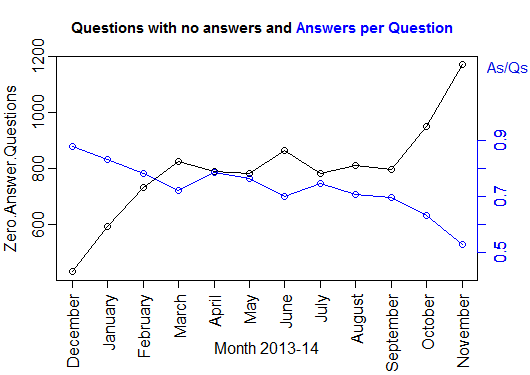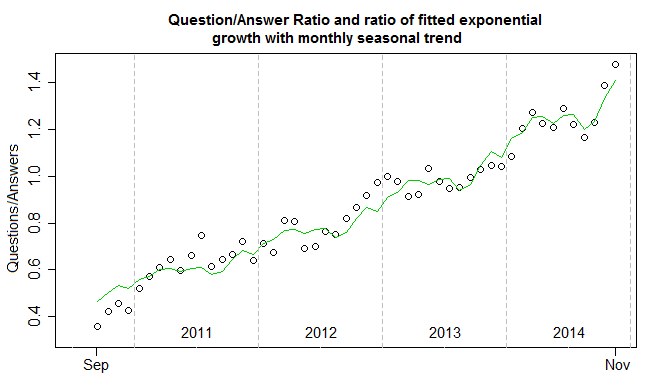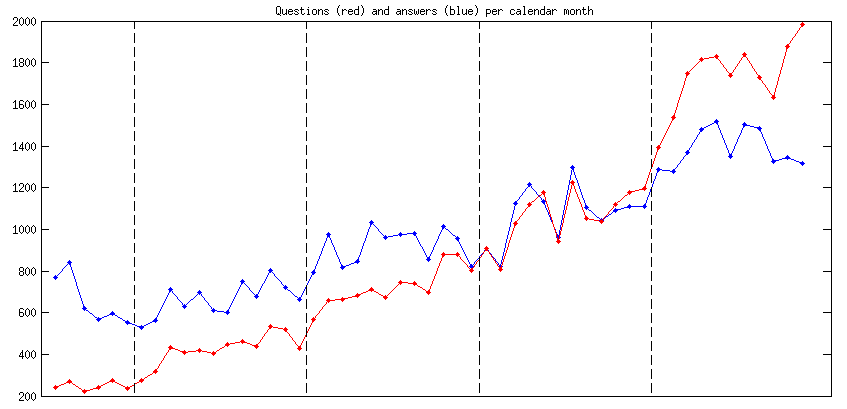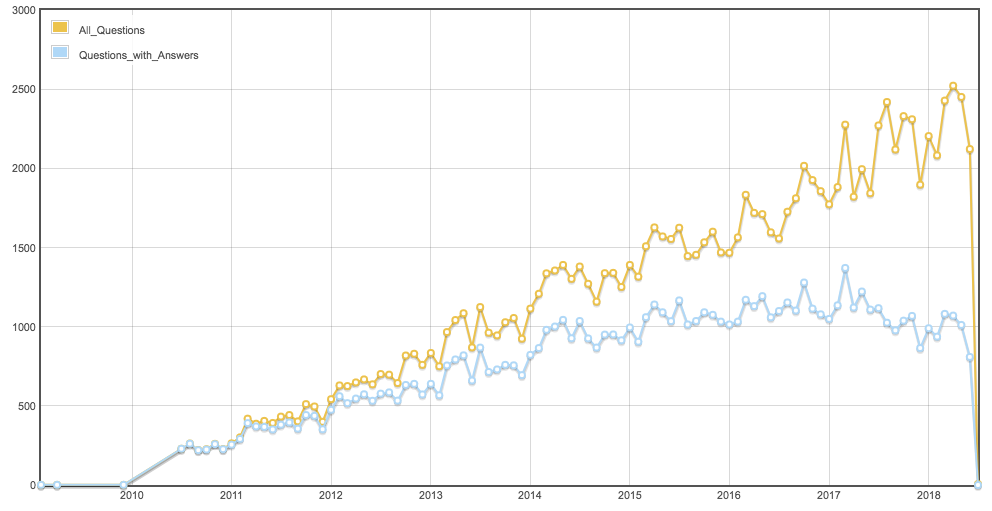From time to time I look at CV site-related stats of various kinds in various places.
I was alarmed to look at this query on Stack Exchange Data Explorer (SEDE), Which shows a dramatic drop in the answers per question and what seems to be an equally dramatic rise in unanswered questions (this query is in reverse time order - the third and fourth columns are what I'm commenting on). Edit: the last couple of months is what concerns me. In the most recent month (November), the zero-answer questions will go down a little in the next few days of course, but I fear not a great deal.

Looking at other queries shows that total answers per month are nearly flat*, but questions per month are going up fast.
*(there's a few days lag in the data so the small recent drop in total answers might not signify anything at all)
Prior to October, in a month we'd never averaged more than about 58 questions per day; in November we averaged 70 questions per day. That's not a small change. It's also about 65% higher than last November, while the number of answers grew about 17.5% in the same period.
Now the number of answers a question gets does rise over time, but generally speaking if a question isn't answered within about a week or so of posting, it's likely to remain unanswered.
If the site is to remain relevant we'll need to find a way to reduce the rise in proportion of unanswered questions.
To that end, I have some thoughts about what things might help:
short term:
Avoiding "answering in comments", or at least going back later and making the comment into an answer if one isn't forthcoming. When all that's needed is a short answer, and the OP responds with "thanks! I see now!" ... it's unlikely to ever get any more action. We should try to reduce these (I've already been trying to do it less myself, but it can become a habit).
Closing more questions that are unlikely to generate answers because they're poor, and the OP isn't going to fix them
long term:
- Ultimately, I think we need more people answering questions - many times more. While more experts would be great, I think we actually need more ... journeyman statisticians, and even in some cases relative novices -- and ways to encourage them to answer a few of the questions within their capabilities.
So my question is in two parts:
We have lots of users - how do we encourage greater participation from a lot more of them to answer questions?
Are there other important things we can do to lift the proportion of questions that get answers?
Edit: I managed to find some time to do some analysis of the questions and answers per month (I looked at September 2010 to November 2014, obtaining updated figures to be sure all of November was included), to try some analysis more or less along the lines suggested by whuber (I don't expect I fitted quite what he had in mind, though).
I fitted a simple model (quasi Poisson glm) with exponential trend (i.e. constant annual growth rate) and (multiplicative) monthly seasonal factors to each series. I totally ignored any serial correlation (but I wasn't looking at any significance tests so this shouldn't be a major issue - my aim was to capture the main effects).
I then plotted the question/answer ratio and the ratio of fitted values from the two models (since that would hopefully pick up the regular seasonal variation in the ratio). The fit is reasonably good, and I can only conclude that whuber's take on it is right - almost all of what we see in the Answer-per-Question relationship (marked in blue in the plot above) is just due to the combination of the relative difference in growth rates and seasonal effects.

The recent few points are a tiny bit worse than the overall trend but there's no suggestion whatever that this is anything more than typical variation about the model (not that I believe the model - but if we have that such a simple model does adequately account for what initially seems to be surprising, it is enough for me to discount the impression that anything new is happening without much better evidence).
That's not to say there's nothing to worry about -- the Answer per Question clearly is getting worse, and at a fairly rapid rate (it has dropped by half in a little less than 3 years). It's just that there's nothing that makes the more recent values substantively different from the existing trend. The answer to the question in the title seems to be "there's no particular reason to think so", but the questions in the body (what to do about the decline) remain.
A small update: looking at posted questions/answers over the last year, it seems that some growth in the ratio has continued, but fortunately at nothing close to the rate I initially feared we may have been undergoing. Currently looking back over the last year that rate seems to mostly in the region of 1.5-ish, but varies between about 1.3 and 1.65. (It's a number I wish was below 1, however.)



